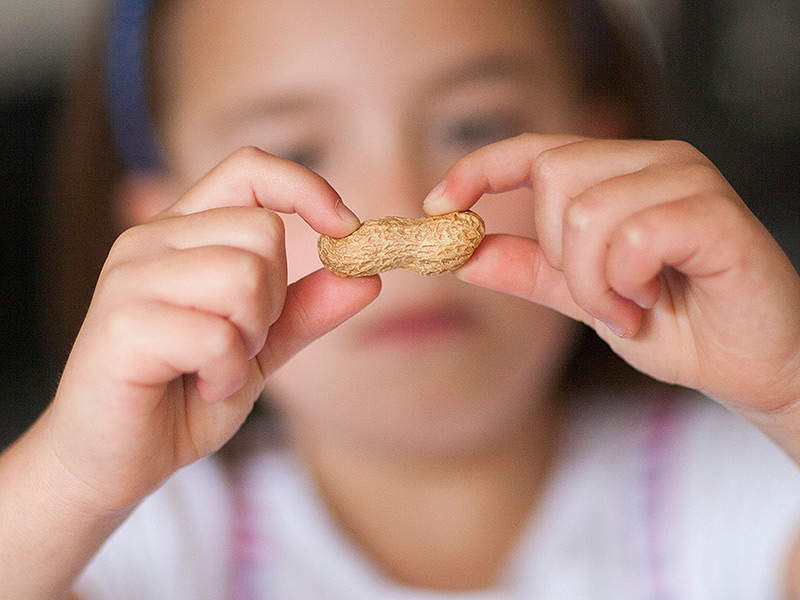
Yet another study is suggesting that feeding your baby peanuts could be a good way to prevent nut allergies later on.
The latest findings found that babies who were fed peanuts regularly significantly cut their risk of developing allergies compared to their peers who were not exposed before age five.
Over the past few years, scientists have warned that recommendations that call for no peanuts until kids are about three years old are outdated. Pediatricians began to go against the grain, doling out new advice to expose babies to peanuts to lessen allergy risks.
British doctors out of King’s College London worked with 550 kids who were categorized as high risk for developing a peanut allergy because of family history, they had a pre-existing egg allergy or they were dealing with eczema.
(The scientists worked with these kids in a 2015 study in which babies were fed peanuts as early as four months old.)
This time around, they wanted to know if regular exposure to peanuts as a baby and toddler helped in the long term if kids stopped eating peanuts.
This time around, they wanted to know if regular exposure to peanuts as a baby and toddler helped in the long term if kids stopped eating peanuts.
To figure this out, half of the group regularly ate peanuts as babies while the others didn’t try them at all. Both groups then avoided peanuts for an entire year. The scientists had parents fill out questionnaires and they collected dust samples from kids’ beds to test for peanut proteins to make sure the participants were adhering to the rules.
Allergy tests were also taken at the end of the study.
After the year was complete, only 4.8 per cent of the babies who tried peanuts earlier on developed allergies to the food. But 18.6 per cent of babies who weren’t exposed to peanuts at all developed an allergy, marking a “highly significant difference,” the researchers say.
“This study offers reassurance that eating peanut-containing foods as part of a normal diet – with occasional periods of time without peanut – will be a safe practice for most children following successful tolerance therapy,” Dr. Gerald Nepom, director of the Immune Tolerance Network, said in a statement.
“The immune system appears to remember and sustain its tolerant state, even without continuous regular exposure to peanuts,” he said.
Nepom and his team say it’s unclear if allergies could set in if kids avoid peanuts for longer than a year but that he’s planning to conduct longer-term studies.
But based on their findings, they say that early and continued consumption of foods with peanuts is safe and linked to decreasing the odds of developing an allergy.
Keep in mind, peanut allergies have been steadily on the rise in recent decades. The number of allergies has more than doubled in the past 10 years across North America. Up to three per cent of kids are affected.
Peanut allergies start early in life. Kids rarely outgrow them and there is no cure.
The Canadian Paediatric Society’s own guidelines, that were reaffirmed last month, say that babies who are at high risk of developing a food allergy can be exposed to potential allergens as early as six months old.
“All of that [previous] information is really based on the consensus of experts,” Dr. Carl Cummings explained to Global News. He’s a Montreal-based pediatrician, professor at the Montreal Children’s Hospital and co-author of the CPS position statement.
“[The old advice] was based on the consensus of opinion rather than actual evidence. The bottom line is it’s believed that the unnecessary delay probably contributed to some of the increase of food allergies that we see,” Cummings told Global News.
If you’re worried about a choking hazard, don’t feed your kids peanuts until they’re able to chew or stick to feeding them a safe amount of peanut butter, doctors say. If your child’s had a food reaction before, talk to your pediatrician before testing peanuts as a safety precaution.
Hives, swelling, vomiting and trouble breathing are signs and symptoms of a food allergy.
Nepom’s full findings were published this weekend in the New England Journal of Medicine.
carmen.chai@globalnews.ca